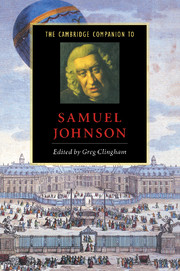Book contents
- Frontmatter
- Introduction
- 1 Extraordinarily ordinary
- 2 Johnson and the arts of conversation
- 3 Johnson's poetry
- 4 Johnson, the essay, and The Rambler
- 5 Johnson and the condition of women
- 6 Johnson's Dictionary
- 7 Johnson's politics
- 8 Johnson and imperialism
- 9 The skepticism of Johnson's Rasselas
- 10 Shakespeare
- 11 Life and literature in Johnson's Lives of the Poets
- 12 Johnson's Christian thought
- 13 “From China to Peru”
- 14 “Letters about nothing”
- 15 Johnson's critical reception
- Further reading
- Index
15 - Johnson's critical reception
Published online by Cambridge University Press: 28 May 2006
- Frontmatter
- Introduction
- 1 Extraordinarily ordinary
- 2 Johnson and the arts of conversation
- 3 Johnson's poetry
- 4 Johnson, the essay, and The Rambler
- 5 Johnson and the condition of women
- 6 Johnson's Dictionary
- 7 Johnson's politics
- 8 Johnson and imperialism
- 9 The skepticism of Johnson's Rasselas
- 10 Shakespeare
- 11 Life and literature in Johnson's Lives of the Poets
- 12 Johnson's Christian thought
- 13 “From China to Peru”
- 14 “Letters about nothing”
- 15 Johnson's critical reception
- Further reading
- Index
Summary
What James Clifford and Donald Greene observed in 1970 is still true: “The history of Johnson's reputation since his own lifetime is in fact complex and needs even more study than it has received.” Their introduction to Samuel Johnson: A Survey and Bibliography of Critical Studies (Survey hereafter) is essential reading for anyone interested in Johnson and his reception. I could, in fact, recommend their survey to my readers and end my essay at this point, except for three considerations: their discussion goes only to 1969 (Greene and John Vance's update, A Bibliography of Johnsonian Studies, 1970-1985, does not include a survey); they offer perhaps more detail than the reader who seeks an introduction might desire; and their discussion considers only indirectly the methods used in Johnson's critical reception.
Two other valuable resources should be mentioned at the outset. Edward Tomarken's History of the Commentary on Selected Writings of Samuel Johnson (1994) contains much that is useful and enlightening, but his “interpretive history” aims for “a new kind of literary method,” which he calls “New Humanism.” Thus Tomarken examines the critical record according to his ambitious goal. In addition, James Boulton's Johnson: The Critical Heritage very conveniently collects and excerpts eighty-one documents related to Johnson's reception from the period 1738-1832.
- Type
- Chapter
- Information
- The Cambridge Companion to Samuel Johnson , pp. 240 - 253Publisher: Cambridge University PressPrint publication year: 1997

